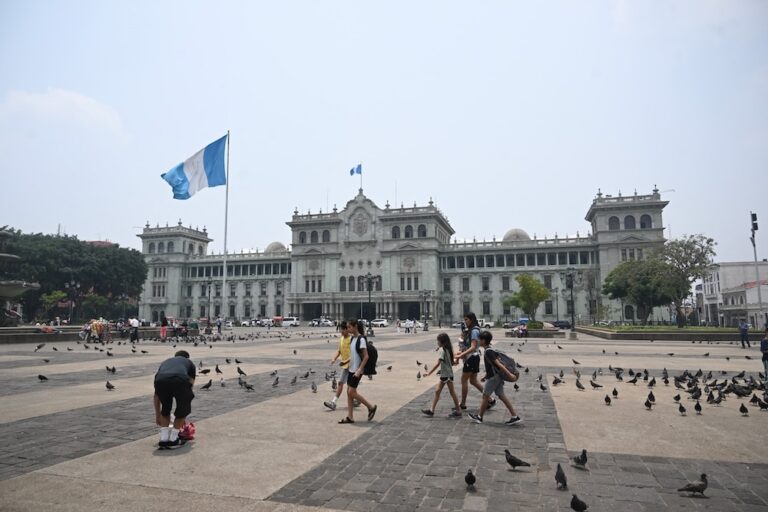(IAPA/IFEX) – The following is an IAPA press release: IAPA welcomes actions in homage to journalist missing for 20 years MIAMI, Florida (August 31, 2001) – The naming of a downtown street in memory of Irma Flaquer Azurdia, the addition of her name to a monument and the holding of a memorial service for her […]
(IAPA/IFEX) – The following is an IAPA press release:
IAPA welcomes actions in homage to journalist missing for 20 years
MIAMI, Florida (August 31, 2001) – The naming of a downtown street in memory of Irma Flaquer Azurdia, the addition of her name to a monument and the holding of a memorial service for her are among the ceremonies to be held in Guatemala City on September 5 to honor the memory of the Guatemalan journalist who disappeared more than two decades ago and is presumed to have been murdered.
The ceremonies are the initial phase of the fulfillment of an agreement reached in March between the government of Guatemala and the Inter American Press Association through the mediation of the Inter-American Commission on Human Rights.
Flaquer, aged 42 at the time, was kidnapped from a street corner on Seventh Street in the Zona 1 neighborhood of Guatemala City on October 16, 1980. It is this location that will now bear her name. She was abducted in reprisal for articles she had written about political repression and human rights violations in the Central American country. Her son Fernando, 24, was killed
in the incident.
Flaquer started work as a journalist in 1970 and a year later began publishing a controversial opinion column titled “Lo que otros callan” (What Others Don’t Say), first in the daily newspaper La Hora and later in La Nacion.
IAPA President Danilo Arbilla described as “enormously significant” what the hemispheric free press organization had achieved in the Flaquer case within the framework of its battle against the impunity that surrounds the murder of numerous journalists. “We are beginning to see the fruits of a systematic effort that we initiated five years ago,” with funding from the John S. and James L. Knight Foundation, said Arbilla, editor of the Montevideo, Uruguay, news weekly Búsqueda. “We are demonstrating that, even if it takes time, we can encourage governments to apply justice as a means of persuading those who would resort to violence that they must respect the work of journalists and in this way press freedom and the people’s right to be informed will be strengthened.”
IAPA Impunity Committee Chairman Alberto Ibargüen, publisher and chairman of The Miami Herald, Miami, Florida, said that “this decision by Guatemala hopefully opens the way for other countries such as Colombia, Brazil and Mexico also to solve the so-far unpunished murders of journalists that are being dealt with by the Inter-American Commission on Human Rights, whose
support has been fundamental in ensuring that the victims are honored, those responsible are brought to justice and their family members find closure.”
In addition to the ceremony naming a stretch of Seventh Street in Guatemala City’s Zona 1 neighborhood, to be conducted by Mayor Fritz García Gallont, a bronze plaque commemorating Flaquer’s journalistic integrity will be added to the monument to deceased journalists in the Guatemalan capital and a Roman Catholic memorial Mass will be held by Father Ricardo Bendaña at the Metropolitan Cathedral. The date of the ceremonies, September 5, was chosen by the IAPA because it was Flaquer’s birthday.
A special delegation from the IAPA, headed by Rafael Molina, chairman of the organization’s Committee on Freedom of the Press and Information and editor of the Santo Domingo, Dominican Republic, magazine Ahora, will take part in the ceremonies. The organization has also scheduled a meeting with Guatemala President Alfonso Portillo and plans to hold other public activities promoting press freedom.
Following the IAPA’s own investigation into the case of Flaquer’s abduction and disappearance and its subsequent adoption by the Organization of American States’ Inter-American Commission on Human Rights, President Portillo issued a decree on August 9 last year accepting his nation’s responsibility in a number of prior cases of violation of civil liberties, including that of Irma Flaquer.
The “amicable agreement” between the Guatemalan government and the IAPA included the creation of the so-called Impetus Committee, responsible for coordinating the activities to pay homage to Flaquer. Among such activities are efforts to speed up inquiries by the Public Prosecutor’s Office to identify who may have ordered Flaquer’s abduction and presumed death, locating her remains, providing monetary restitution to her family members, setting up a scholarship and university chair in her name, and compiling and publishing her writings.
In addition to Molina, the IAPA delegation will be made up of former Presidents Andrés García Lavín, of Novedades de Mérida, Yucatán, Mexico; James McClatchy, of McClatchy Newspapers, Sacramento, California; 2nd Vice President Andrés García Gamboa, of Novedades de Quintana Roo, Cancún, Mexico; Press Freedom Coordinator Ricardo Trotti, and Chapultepec Project Lawyer Jairo Lanao.


